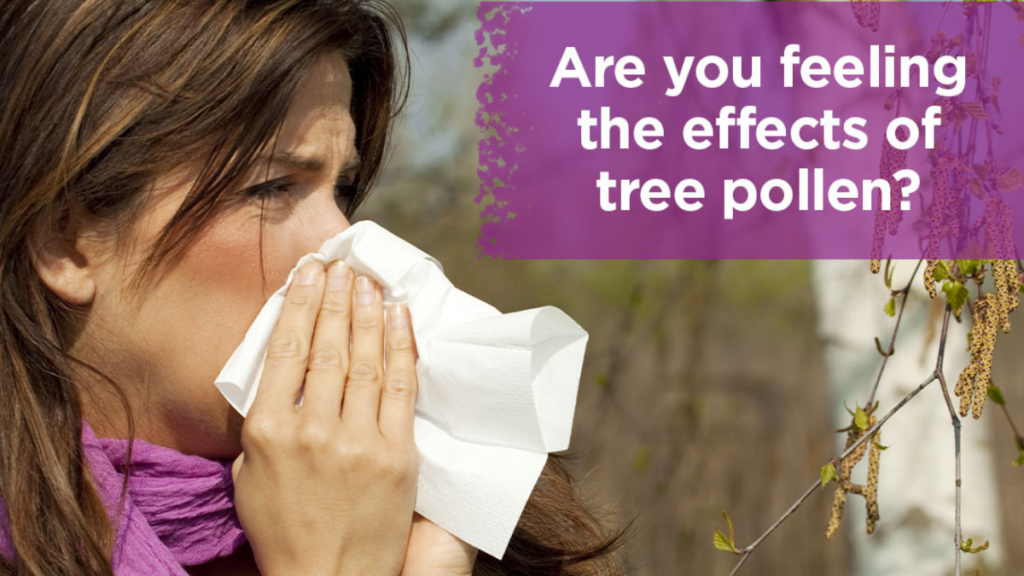If allergies are making you more miserable than usual this spring, you’re not alone. This year in West Virginia, doctors confirm that more people are reporting symptoms, and earlier than usual.
Dr. James Clark specializes in allergy and immunology for Thrush & Clark Allergists under the umbrella of the Charleston Area Medical Center Health System. He said he has seen an increase in new patients seeking help for relief from their symptoms and confirms that this year is a particularly tough one for seasonal allergy sufferers.
Clark said shifting climate patterns, a longer growing season, and the early arrival of tree pollen are contributing to this year’s higher numbers.
“What really causes spring pollen allergies is tree pollen, and we have a lot of trees here, so we have an intense tree pollen season,” Clark said.
The arrival of spring dictates when trees begin to bloom and pollen counts rise.
“This year, right around early March, it got warm and kind of got everything going,” Clark said. “And then we had that cold spell, if you remember, and that kind of shut everything down and put some of these trees on a holding pattern.”
Pollen counts vary by the time of day, the season and weather conditions. As temperatures fluctuate, the constant cooling and warming effect causes a higher release of pollen. When it’s damp or humid, there’s a higher mold count but mold can also spread in dry, windy weather.
“And now that it’s really started to warm up, those trees that were in the holding pattern have gone ahead and really bloomed out,” he said. “So that’s what’s leading to a delayed, intense spring tree pollen season.”
This roller coaster weather pattern has created conditions that are giving rise to higher counts of pollen in the air. A warmer than normal January, followed by a cold spell, and a few weeks ago, warmer temperatures with high winds, have aggravated the situation.
Clark said on rainy or windless days tree pollen does not circulate as easily.
“So warm and windy: the pollen counts are high in the morning and sort of drop off in the afternoon and evening,” Clark said. “It’s that warm, breezy day that really will fuel the high pollen counts, it’s really a lot of pollen in the air.”
The reason pollen, or other allergens like mold, affect people so badly is their own immune system. That’s where allergic reactions begin.
When a harmless substance like dust, mold, or pollen is encountered by someone who is allergic to that substance, their immune system can go into overdrive, producing antibodies that attack the allergen.
“Part of the problem with allergies is this mucus that is produced and the same with asthma,” Clark said. “The more viscous or thicker it becomes the more difficult it is to clear. That can lead to bronchitis or sinusitis if you are not clearing the lungs or sinuses.”
For nasal congestion, Clark said it is best treated by nasal sprays. Originally prescription only, they’re easily purchased over the counter.
“Those help,” Clark said. “What the classic allergy symptoms are – the sneezing, the itching, the clear watery runny nose, those are best treated by antihistamines like claritin, Zyrtec, Allegra, another one called Xyzal, those are really good 24-hour antihistamines to help blunt that histamine response.”
If tree pollen is your main trigger, your symptoms might drop off by the end of May, but Clark said most people suffer from multiple pollen allergies. While the tree pollen season lasts from March through May, the grass pollen season begins in April and lasts through July.
“It’s going to really be heavy until the heat of the summer when the grass pollen kind of drops off, when everything gets dry and dormant, that’s when the grass pollen allergies slack off,” Clark said. “Then, come August, the weed pollen will kick in and that will be the fall allergy season.”
So, while midsummer may offer some reprieve for allergy sufferers, the fall season ramps up with its own variety of allergens.
Clark said tests can help pinpoint the exact cause of specific allergies making it easier to treat or avoid those triggers.
“It is very helpful to find out if you are allergic,” Clark said. “A lot of people come in with the mantra, ‘I’m allergic to everything,’ when in fact, once we do the testing, they are not allergic to anything. It’s not allergies. One of the more common things I see that looks like and mimics allergies, is chronic sinusitis.”
Chronic sinusitis requires a different treatment than allergies. Clark said for the latter people can grow out their allergies with shots that help modify the disease process over time.
Clark said recent advancements in medicine offer more options for allergy sufferers.
“If you haven’t been to the doctor for a while and maybe you have a history of allergies which have gotten worse, things have changed a lot in what we do these days so maybe it’s not a bad idea to be re-evaluated.”
Biologics, or monoclonal antibodies, are one of the latest treatments for asthma, nasal polyps, eczema and allergies. Derived from living organisms, they offer the high potency of anti-inflammatory steroids like prednisone but with fewer side effects.
Considered a “precision medicine” they avoid what Clark calls the “collateral damage” by attacking one specific pathway rather than multiple pathways.
“It’s very precise, it’s almost like a scalpel versus a howitzer, so you get the desired effect from the medicine without a lot of undesirable effects,” he said.
Clark said strengthening the immune system through overall health and nutrition is important for allergy sufferers. That includes drinking enough water.
“Staying hydrated is extremely important. People with certain conditions, like asthma or allergy conditions, tend to have a lot of insensitive loss of water,” Clark said. “They’re mouth breathing a lot, so they’re losing moisture through their breathing and may not even know it.”




















